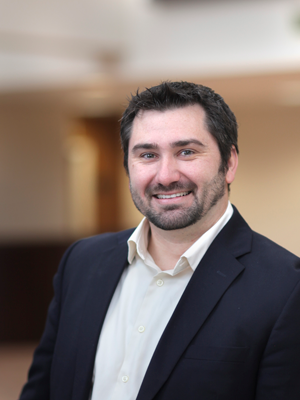Money: Make Smart Money Moves By Getting Down and Dirty in Your 30s

Audio By Carbonatix

Courtesy of Jay Gershman, Retirement Visions LLC
Sponsored advertising content provided by Retirement Visions LLC
By Jay Gershman, Retirement Visions LLC, West Hartford

Jason Hand. Courtesy photo
As far as financial life decades go, people in their 30s have it the toughest. While people in their 20s are enjoying freedom with friends and self-exploration, turning 30 ultimately means that it’s time to get serious. On the bright side, careers are generally cemented and salaries are starting to grow, but major life changes such as marriage, kids, and home purchases mean that cash flow is tighter than ever before.
That’s why I’ve enlisted Retirement Visions Vice President and our resident 30-something Jason Hand to give us a glimpse at what Gen Y/Millennial straddlers should be focusing on to make the most of their money both today and for the future. Here’s Jason.
Life is pretty much chaos for those of us in our 30s. Many of us are getting married, starting a family, and making our first real estate purchases. More and more are starting businesses or moving up the ladder within our industry. We’re making more money, but we’re spending more, too. If there was ever a time to keep a close eye on our cash flow, now is it. Let us take a look at the opportunities to take advantage of and pitfalls to avoid while we are in our 30s.
The Wedding
Did you know that the average wedding costs over $30,000? If you took that same $30,000 and invested in at an average rate of 6 percent[1], you’d have over $230,000 by the time you retired at 65. Ah, the power of compound interest! Sure, it’s the biggest day of your life but it is just one day, so it’s worth investigating ways to save. Venues offer cheaper rates if you choose a day of the week other than Saturday and keeping your guest list to close friends and family will reduce that cost per head. At the end of it, no one will care if you choose to go with a buffet instead of a plated dinner, I promise!
The Baby
Babies themselves aren’t the expense you need to worry about, it’s the health and care costs. If you don’t have a Health Savings Account (HSA), now is the time to get one. If you’re not utilizing the one you have, get going. An HSA allows you to put money away, tax-free, to pay for medical expenses. The average U.S. hospital delivery stay costs $3,500 but can shoot up to nearly $9,000 when you include prenatal, delivery-related and post-partum healthcare[2]. Once the baby is home, most families have to consider childcare which can be around $12,000 per year for daycare or $30,000 per year for in-home care in the state of Connecticut[3].
The House
The financial crisis of 2008 has made it a bit tougher to get a mortgage and there are a few things to think about before you apply. Many of us know that banks highly rate credit scores, so be sure to check yours early in the process so you have some time to get it up if need be. Another thing to know is that if your deposit is less than 20 percent of the purchase price, you will be required to Personal Mortgage Insurance (PMI). This can cost anywhere from 0.5 percent to 1 percent of the purchase price annually until you have at least 20 percent equity in your home.
Finally, many people buying their first home forgo the home inspection to save a few hundred dollars. Don’t do it! A good home inspector who is local to the area will be able to test all water, air, and gas levels in the home, in addition to any potential issues that need repair. It might be a cost upfront, but it will save you serious headaches in the future.
The Career Change
After a decade or more in the workforce, many of us choose to change jobs, industries, or go at it on our own. In doing that, we often forget about our 401(k). Remember, your 401(k) is your hard-earned money and making the most of it is absolutely crucial for your retirement. Talk to an expert about your options. You might consider rolling your current account into an IRA to have more control over the investments inside your account. Another option could be to roll the account into your new employer’s 401(k) plan for consolidation and to keep your investments in one place. You will want to compare fees inside the different accounts and investment options to make sure your strategy is the most cost-efficient one. It might even be time to discuss converting to a ROTH. Based on the current tax law, you might be in the lowest tax bracket you will ever be in, especially if one spouse is not working and taking care of the little one(s).
Other Considerations
With so many new “assets,” protection is key. Be sure to consider term life insurance with at least 10 times your salary for basic needs or up to 20 times your salary to cover your family. Also, think about disability insurance. A 35-year-old has a 50 percent chance of being disabled and being out of work for more than 90 days. If you had the option of a job earning $75,000 per year with no disability or a job earning $70,000 per year with the benefit for $45,000 per year in the event of disability, which would you pick?
Finally, consider your savings and be sure to pay yourself first. You’re working hard today but the goal is to make sure that you can retire as soon as possible with financial security. Typically, if you can save 10 percent of your salary during your working years, your retirement should be successful. Make sure you are adding enough to your 401(k) to get the employer match if that’s available. Once you’ve done your 401(k), consider utilizing a Roth IRA. Roth’s are great as you can always get your contributions back for emergencies and they can also be used for higher education needs for the kids in the future. I treat myRoth IRA as an emergency account.
Just remember that time goes by fast and the little ones grow up in the blink of an eye. Take the time to enjoy these memories and make the most of them. They will be gone before you know it.
Jay Gershman is the Owner and Founder of Retirement Visions LLC, a West Hartford-based financial planning firm that focuses on comprehensive life planning and financial management. Jason Hand is the firm’s vice president and with 15 years of experience in financial planning, he loves helping people from their 30s right up through retirement. For more information, visit www.allset2retire.com. Information and advice are for guidance only and opinions expressed belong solely to the author. Securities offered through Securities Service Network, LLC. Member FINRA/SIPC. Fee-based services are offered through SSN Advisory, Inc., a registered investment advisor.
Like what you see here? Click here to subscribe to We-Ha’s newsletter so you’ll always be in the know about what’s happening in West Hartford!
Sources
[1]The Standard & Poor’s 500® (S&P 500®) for the 10 years ending December 31st 2016, had an annual compounded rate of return of 6.6 percent
[2]The Agency for Healthcare Research and Quality Healthcare Cost and Utilization Project and a Thomson Healthcare study for March of Dimes.
[3]Average cost of child care in CT as much as in-state tuition – CT Mirror




[…] Money: Make Smart Money Moves By Getting Down and Dirty in Your 30s […]